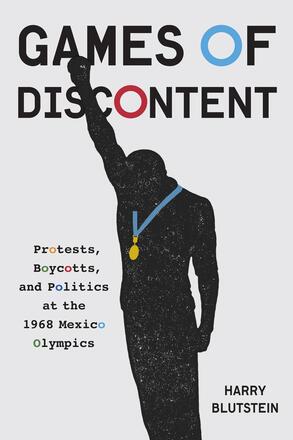
Games of Discontent
Protests, Boycotts, and Politics at the 1968 Mexico Olympics
What was behind the black power salute, boycotts, and political battles that characterized the 1968 Summer Olympics?
Description
The year 1968 was ablaze with passion and mayhem as protests erupted in Paris and Prague, throughout the United States, and in cities on all continents. The Summer Olympic Games in Mexico were to be a moment of respite from chaos. But the image of peace – a white dove – adopted by organizers was an illusion, as was obvious to a record six hundred million people watching worldwide on satellite television. Ten days before the opening ceremony, soldiers slaughtered hundreds of student protesters in the capital.
In Games of Discontent Harry Blutstein presents vivid accounts of threatened boycotts to protest racism in the United States, South Africa, and Rhodesia. He describes demonstrations by Czechoslovak gold medal gymnast Věra Čáslavská against the Soviet-led invasion of her country. The most dramatic moment of the Olympic Games was Tommie Smith and John Carlos's black power salute from the podium. Blutstein furnishes new details behind their protest and examines how this iconic image seared itself into historical memory, inspiring Colin Kaepernick and a new generation of athlete-activists to take a knee against racism decades later.
The 1968 Summer Games became a microcosm of the discord happening around the globe. Describing a range of protest activities preceding and surrounding the 1968 Olympics, Games of Discontent shines light on the world during a politically transformative moment when discontents were able, for the first time, to globalize their protests.
Reviews
"Games of Discontent is a fresh and very accessible account of the 1968 Olympics, in all their complexity. Harry Blutstein appraises the interplay between acts of athlete dissent at the Olympic Games and protest movements outside the sports arena. In doing so, he uses a global lens to pinpoint the political and historical forces that helped detonate the explosion of athlete-activism at the 1968 Games. This unflinching analysis of the extended 1968 moment – a key historical conjuncture of politics and sports – helps us understand how sport can be a vital site for political resistance." Jules Boykoff, Pacific University and author of NOlympians: Inside the Fight against Capitalist Mega-Sports in Los Angeles, Tokyo and Beyond
"Thoroughly enjoyable and well-researched, this book provides wonderful insight into the full gamut of contentious politics surrounding the 1968 Olympics Games. Blutstein's account is filled with colour and verisimilitude, drawing together forms of resistance and protest from the anti-Apartheid movement to the black power salute, and from Czechoslovak opposition to the '68 Soviet invasion to the Tlatelolco massacre. Games of Discontent is well worth a read." Peter Gardner, University of York
"More than half a century after the 1968 Olympic Games in Mexico, parts of the underlying drama continue to emerge for examination and assessment. The spectacular sport performances have sunk into relative obscurity, eclipsed by the stunning visual impact of live television coverage, both sport and news, against the background of international protest. The postponed Tokyo Olympics will face the same issues of athlete conduct on the field of play and the podium. This book is an important part of a continuum that began long before but was made powerfully visceral to a worldwide audience on the Olympic stage." Richard W. Pound, International Olympic Committee
"Games of Discontent enriches and enhances our understanding of the Olympic games in Mexico City. [Blutstein] captures the revolutionary mood of the era. He also reinforces the political significance and symbolism of sport, provides further evidence of the IOC's inability to match its moral rhetoric with moral action, and offers more examples of the lamentable words and deeds of its deplorable president, Avery Brundage." Doug Booth, Jane Austen Society for Sports History